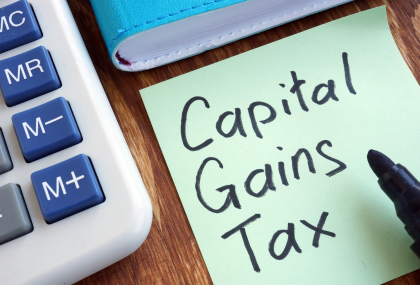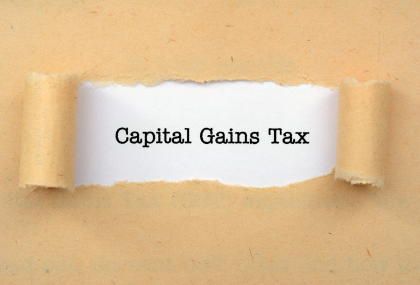Capital Gains Tax After Selling A House in Denver, CO
Discover essential insights on capital gains tax implications when selling your home in Denver, CO. Learn strategies to maximize your profits and navigate local tax regulations effectively.

Understanding Capital Gains Tax on Real Estate Sales
Knowing about the capital gains tax is important for people in Denver, Colorado who want to make the most money from selling their homes. If you sell your home for more than you paid for it, you will have to pay capital gains tax on the difference.

The IRS sets clear rules for how these taxes are figured and what exemptions may apply in Denver, as well as in other parts of the United States. For example, if you stayed in your main home for at least two of the five years before you sold it, you might be able to get an exemption that lets you avoid paying capital gains tax on up to $250,000 of profit if you’re single and $500,000 if you’re married and filing jointly.
But it can be hard to figure out capital gains because of things like home improvements and closing costs that can change your cost base. Also, you should think about the rules that apply to your state and any changes that might happen to tax laws that could affect your duties.
Talking to an experienced accountant or real estate professional who knows the Denver market can help you stay in compliance and get the best financial results during real estate deals
How to Calculate Capital Gains Tax When Selling a House
To figure out the capital gains tax on the sale of a home in Denver, Colorado, you need to know how the tax is calculated. Find out how much the house cost to buy in the first place. This is called the “cost basis.”

Add to this amount any major changes you’ve made over the years, such as additions or renovations. These can raise your adjusted cost basis and possibly lower your taxable gains. Next, figure out how much the house is worth and take away any costs that come with selling it, like real estate buyer fees or closing costs.
This is your capital gain: the difference between the adjusted cost base and the net selling price. It’s important to know that if you stayed in your main home for at least two of the last five years before selling it, you may be able to avoid paying a lot of capital gains tax—up to $250,000 if you’re single and $500,000 if you’re married and filing jointly.
This exclusion can cut your taxed gains by a lot or even get rid of them completely. If you make more than these amounts, though, you may have to pay capital gains taxes.
Exemptions and Deductions for Capital Gains Tax on Property
When you sell a house in Denver, Colorado, it’s important to know what exemptions and credits you may be able to get for capital gains tax. The main residence exclusion lets single taxpayers exclude up to $250,000 in capital gains and married couples filing jointly can exclude up to $500,000. However, there are some conditions that must be met.
For this exemption to apply, the homeowner must have owned the home and stayed in it as their main home for at least two of the five years before the sale. This restriction can only be used once every two years, so keep that in mind.
On top of that, you may be able to subtract some of the costs you paid to sell the house, like real estate buyer fees and closing costs, from your capital gains tax. Knowing about these deductions and exemptions can have a big effect on how much you have to pay in taxes when you sell a house in Denver’s fast-paced real estate market.
Effects of Primary Residence Exclusion on Capital Gains Taxes

When people in Denver, Colorado sell their homes, they need to know how the main residence exclusion affects their capital gains taxes. If certain conditions are met, the main residence exclusion lets homeowners keep up to $250,000 in capital gains from being taxed if they are single and up to $500,000 if they are married and filing jointly.
For this restriction to apply, the homeowner must have owned and lived in the home as their main residence for at least two of the five years before the sale. Many Denver homeowners who sell their main home can pay much less in capital gains taxes or none at all thanks to this tax benefit.
It’s important to remember, though, that this exception doesn’t apply to rental houses or second homes. People who own a home should also think about any changes they’ve made to it during their ownership, as these can raise the cost base and lower taxable gains even more.
The Role of Depreciation Recapture in Calculating Real Estate Taxes
When you sell a house in Denver, Colorado, you need to know what depreciation recovery means in order to figure out your real estate taxes. When a property has been used as an investment or rental, depreciation recapture comes into play. This lets the owner claim depreciation payments over the years to lower their taxable income.
When the property is sold, though, these amounts that were withheld may be taxed under the capital gains tax rules. The Internal Revenue Service (IRS) says that the property’s loss in value must be “recaptured” and charged at a rate of up to 25%.
This means that any gain due to property loss needs to be reported separately from other cash gains. When a homeowner changes their property from an investment or rental to personal use before selling it, they need to keep accurate records of all the losses they claimed while the property was being rented. Capital gains taxes can be more complex when dealing with an investment property, especially if you’re selling a rental home rather than a primary residence.
When you sell a home in Denver, knowing how depreciation recovery works with capital gains tax calculations can have a big effect on your money. Taking these things into account correctly makes sure you follow IRS rules and helps you plan your general tax strategy well. Get a fast cash offer from investor home buyers in Colorado Springs.
How the 1031 Exchange Can Defer Capital Gains Taxes
A 1031 exchange, which is also known as a “like-kind exchange,” can help you sell your Denver, CO home without having to pay capital gains taxes right away. Part 1031 of the Internal Revenue Code says that people who sell an investment property can buy another approved like-kind property with the money from the sale and put off paying capital gains taxes for a while.
Real estate investors who want to grow or improve their businesses without having to pay a lot of taxes right away will find this method very useful. In Denver, the real estate market is always changing. A 1031 exchange lets buyers buy new homes with their extra money without having to pay capital gains taxes right away.
Homeowners can lower their tax bills and take advantage of business possibilities in the area by following the IRS’s rules and deadlines. For example, they must find replacement properties within 45 days and close the deal within 180 days.
Using Loss Harvesting Strategies to Offset Capital Gains

When selling a home in Denver, CO, knowing how to use loss harvesting wisely can have a big effect on how much capital gains tax you have to pay. Loss harvesting is when you sell stocks at a loss to balance out the capital gains from the sale of your home. This lowers your taxable income.
When it comes to real estate, this approach lets people lower the amount of capital gains tax they have to pay by using investment losses from other parts of their portfolio. Homeowners in Denver should carefully look at their finances and work with a tax professional to find out what kinds of losses they might be able to make before or during the year they sell their home.
In this way, they can use these losses to offset any gains they make from the property deal. This method not only helps with short-term tax issues, but it is also very important for long-term financial planning because it makes taxes more efficient overall.
Reporting Requirements for Real Estate Transactions in Denver, Co
It’s important to know the reporting rules for real estate deals in Denver, CO, before you sell your home to make sure you don’t get hit with capital gains tax. As in the rest of the US, people who sell their home must report any capital gains on their federal income tax return. This is also true in Denver.
The Internal Revenue Service (IRS) requires people to report these gains on Form 8949 and Schedule D. If you sell your main house and meet certain requirements, like living in the home for at least two of the last five years, you may be able to get a tax break on the capital gains from the sale. For single filers, this can be up to $250,000, and for married couples filing jointly, it can be up to $500,000.
If your property doesn’t meet these requirements, on the other hand, or if it’s a business property or second home, the rules are different. It’s also important to keep careful records of any changes you make to the property over time, as these can be added to the home’s base and may lower your taxable capital gains.
Navigating State and Local Taxes When Selling Property in Colorado

When people in Denver, Colorado sell their homes, they need to know all about the complicated capital gains tax. In Colorado, both state and city taxes can change how much money you get when you sell your home. In Colorado, there is no special tax on capital gains. Instead, all income, including capital gains, is taxed at the same rate of
40%. But it’s important to think about exemptions and discounts that might apply to you when you’re dealing with these taxes. This provision is mostly for federal taxes, but it can also change how much taxable income is reported to the state of Colorado. In addition, Denver city does not charge any extra capital gains tax on top of what the state requires. Homeowners in Denver should also be aware of any changes to the law that might affect property sales taxes and talk to a tax expert to make sure they are following all the rules and saving as much money as possible when they buy or sell a home. You can learn more about our process of buying houses and what to expect when selling your home to us.
Common Mistakes to Avoid When Filing Taxes After Selling a House

When you sell a house in Denver, Colorado, you need to know about capital gains tax. Also, if you don’t make these common mistakes when you file your taxes, you can avoid losing money. People often make the mistake of not correctly figuring out their home’s cost basis, which includes both the purchase price and any changes made over time.
If you don’t do this, you might overstate your capital gains and end up paying more tax than you need to. Not taking into account allowable exclusions, like the $250,000 exclusion for single filers or the $500,000 exclusion for married couples who meet certain conditions, can also have a big effect on your taxable gain.
Another mistake is not knowing the requirements for these exemptions. The sellers must have owned and lived in the home as their main residence for at least two of the five years before the sale. A lot of the time, sellers forget to report any loss of value on a home office or renting part of their property. This can lead to an unexpected capital gains liability.
Also, make sure you keep accurate records of all your deals and the proof you need for deductions and exclusions. Making mistakes like giving wrong due dates or not reporting the sale at all could lead to fines from the IRS.
Legal Considerations When Transferring Property Ownership

People who want to sell their homes in Denver, Colorado, need to know the rules about capital gains tax when they transfer property ownership. Before you do anything else, it’s very important to see if the home meets the standards for the main residence exclusion. The house might not have to pay any capital gains taxes if it does.
The owner must have lived in the house as their main home for at least two of the last five years before they can sell it. Not only do you need to know how Colorado’s laws affect federal tax laws, but you also need to know how those laws affect each other.
Before they try to sell their home, people should learn about tax rules in Denver CO, exemptions, or benefits that could help them. They can help you through these difficult steps and make sure that all the legal requirements are met when you change ownership of a property. Talk to a real estate lawyer or tax advisor who knows the Denver real estate market.
Evaluating the Pros and Cons of Selling vs Renting Out Your Home
When in Denver, you should think about the pros and cons of both selling and renting out your home. This is especially true when it comes to capital gains tax. You might get money right away when you sell your home, but you might have to pay capital gains tax if the profit is more than the $250,000 exemption for single filers or the $500,000 exemption for married couples filing jointly.
The Denver real estate market is strong right now, which could cause the value of your home to go up a lot. But if you decide to rent out your home, you might get steady idle income and maybe even tax breaks like depreciation deductions.
To figure out how each choice will affect your finances, you need to carefully think about current market trends, your long-term investment goals, and the effects of Colorado’s capital gains tax rules. We buy houses in Denver is a cash home buyers in Fort Collins and we make fair, no-obligation offers.
How Do I Calculate Capital Gains Tax on a Home Sale?
There are a few important steps you need to take to make sure you follow IRS rules and get the most money out of your home sale in Denver, CO. First, figure out your home’s cost basis, which is the sum of the price you paid for it and any changes you’ve made to it while you’ve owned it.
Next, figure out how much the house is worth and take away any costs that come with selling it, like real estate buyer fees or closing costs. Your capital gain is the difference between the adjusted cost base and the net price you sold it for.
Homeowners in Denver and the rest of the U.S. may be able to get a capital gains tax exclusion if they have lived in the property for at least two of the five years before selling it. This means that single filers can exclude up to $250,000 from their taxable income and married couples can exclude up to $500,000. What if you don’t meet these requirements or have already claimed an exclusion within the last two years? If so, you will have to pay federal capital gains tax rates based on your income band.
What Is the 20% Rule for Capital Gains?

When you sell a house in Denver, CO, it’s important to know about the capital gains tax, especially the 20% rule for capital gains. When you sell a house and make a profit, you have to pay capital gains tax. The rate you pay depends on your income and how long you owned the house.
If you have been in your home for more than a year and make the most money, the 20% rule can apply to your long-term capital gains tax rate. Homeowners in Denver, like homeowners everywhere else in the U.S., may be able to get certain exemptions that can greatly lower their taxable gains.
The home must have been yours for at least two of the last five years before you sell it. If you meet certain requirements, you may not have to pay capital gains tax on up to $250,000 ($500,000 for married couples). But people with high incomes may still have to pay a 20% tax rate on any profit left over after these exceptions.
Understanding these details is important when planning how to sell your home to make sure you follow IRS rules and get the best financial results.
What Is the Sales Tax on a House in Colorado?
If you’re selling a house in Denver, Colorado, you need to know about the capital gains tax and how it is different from sales tax. When homes are sold in Colorado, there is no sales tax directly applied to the sale of those houses.
Instead, people who sell their homes and make money should think about capital gains tax if they make money. The capital gains tax is based on the difference between how much the home sold for and how much it cost to buy in the first place, less any improvements or costs that were paid while the home was owned.
When people in Denver plan to sell their homes, they need to know how the federal and state capital gains taxes work. Even though Colorado doesn’t have its own capital gains tax on top of the federal one, buyers should be aware that there may be local transfer taxes or fees that they need to pay when they close a deal in Denver.
Talking to a tax expert can help you understand these things better and make sure you’re following all the rules while getting the most money from the sale of your home.
Helpful Denver CO Blogs

- Capital Gains Tax After Selling A House In Denver, CO
- Can I Sell My House Below Market Value In Denver, CO
- How Long Can I Leave a House Vacant in Denver, CO?
- How to Sell a House Without a Realtor in Denver, Colorado
- Selling a House With Unpermitted Work in Denver
- FSBO Costs in Denver, CO
- Can I Sell My House With Furniture in Denver?
- How to Split a House in Divorce (Denver)
- How to File Quit Claim Deed in Denver, Colorado
- How Do I Short-Sell My House in Denver, CO?
- Can I Sell for Less Than Appraised in Denver?
Resources To Help You Sell A House In Colorado
Give Us A Call Now At 720-738-6020
If you need to Sell your house fast in Colorado, we promise to make you a fair, no-obligation, no-hassle offer. Take it or leave it. You’ve got nothing to lose.
Do you still have questions? Calling us could be the best decision you make all week!
